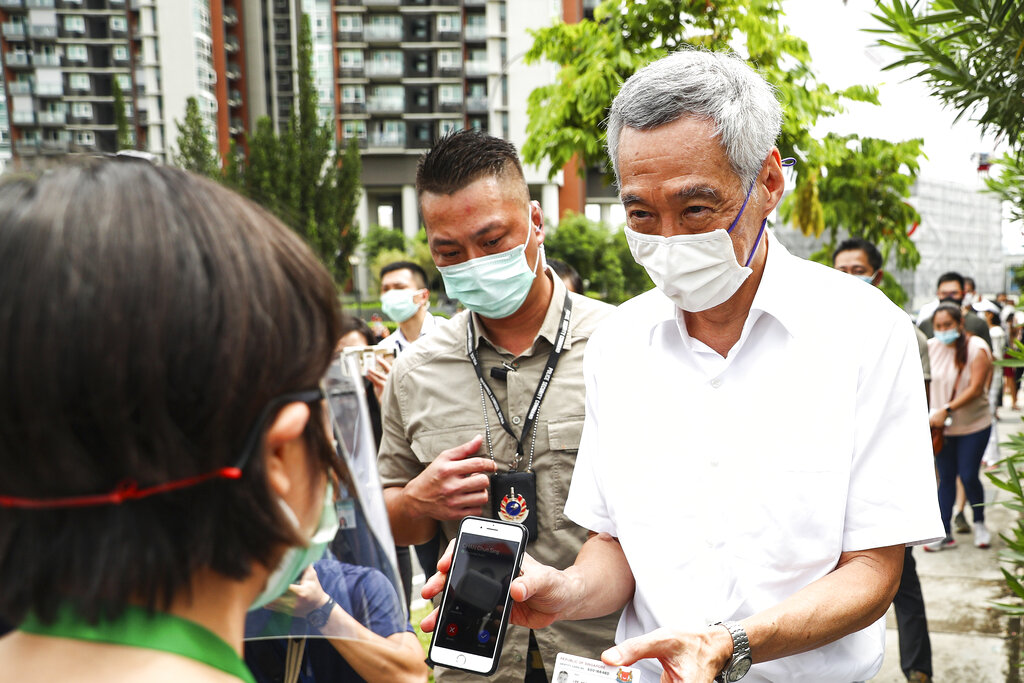Singapore’s ruling party holds on to power but faces setback

People’s Action Party Secretary-General and Singaporean Prime Minister Lee Hsien Loong, right, verifies his identity with a polling official at the Alexandra Primary School polling center in Singapore, Friday, July 10, 2020. (AP)
SINGAPORE — Singapore Prime Minister Lee Hsien Loong’s long-governing party comfortably won Friday’s general elections, which took place amid the coronavirus pandemic, but faced a setback as the opposition made minor gains.
Lee said his People’s Action Party secured 83 parliamentary seats, or 89% of the total, while its popular vote dipped to 61%. The Workers Party, the only opposition with a presence in parliament, increased its seats from six to 10. It marked a decline in the PAP’s performance from 2015 polls where it took 93% of seats and nearly 70% of total vote.
“It’s not as strong a mandate as I hoped for but it’s a good mandate,” Lee told a news conference. “This was not a feel-good election but one where people are facing real problems and expect more rough weather to come.”
The PAP has dominated politics since 1959, when Lee’s father, Lee Kuan Yew, became Singapore’s first prime minister and built the resource-poor city-state into one of the world’s richest nations during 31 years in office. But it has also been criticized for tight government control, media censorship and use of oppressive laws and civil lawsuits against dissidents.
“In the Singapore context, this is a defeat (for PAP). Worst seat performance and loss of popular vote in an election that they called early in a pandemic mistakenly thinking the crisis would help them,” said Bridget Welsh, honorary research associate at Malaysia’s University of Nottingham.
“The PAP has a mandate but one that puts the party on notice that Singaporeans, especially young Singaporeans, expect more,” she said.
Polling was earlier extended by two hours until 10 p.m. (1400 GMT) after strict safety measures in place for Southeast Asia’s first national election amid the pandemic delayed voting at some stations. The Election Department also dropped a requirement that disposable gloves be worn during voting to cut waiting time.
Retiree Dennis Phua said the election shouldn’t have been rushed since the PAP’s five-year mandate would have continued until next April. He said he hopes for louder opposition voices in parliament so the PAP wont be “so arrogant.”
“There are so many things we are not satisfied with. It’s a good government, but the way they do things can be better,” Phua said as he waited outside a school to vote.
But not all agree.
“I hope that it will remain as the status quo. For so many years, it has been the same and so far so good,” said homemaker Florence See.
Lee has faced opposition from his estranged younger brother, Lee Hsien Yang, who said the PAP had turned into an elitist party. The younger Lee joined an opposition party last month but is not running in the election. The prime minister has said the polls are about ensuring a strong government to secure the country’s future, not his family feud.
Singapore’s election follows polls in Serbia and Mongolia last month and in South Korea in April, when governing parties in all three countries scored resounding victories.
The polls come just weeks after the country emerged from a two-month lockdown aimed at controlling one of Asia’s worst coronavirus outbreaks. The tiny nation of 5.8 million people has reported more than 45,000 cases, most of them foreign workers living in crowded dormitories that were overlooked in the early phase of its crisis management.
With the economy forecast to shrink this year by up to 7%, Lee’s government has unveiled several economic assistance packages totaling nearly 100 billion Singapore dollars ($71.7 billion) but warned the full economic impact hasn’t been felt yet.
While coronavirus cases have mostly declined, new daily cases still top 100.
The government increased the number of polling stations from 880 to 1,100 and implemented a slew of safety measures such as masks and temperature checks.
Voters were given a two-hour window to cast their ballots to reduce crowding, with senior citizens given priority to vote in the first four hours. Election officials were wearing full personal protective gear and polling booths were sanitized every half hour. People being treated for COVID-19 or under quarantine at home were not allowed to vote.
/dam
For more news about the novel coronavirus click here.
What you need to know about Coronavirus.
For more information on COVID-19, call the DOH Hotline: (02) 86517800 local 1149/1150.
The Inquirer Foundation supports our healthcare frontliners and is still accepting cash donations to be deposited at Banco de Oro (BDO) current account #007960018860 or donate through PayMaya using this link.


















